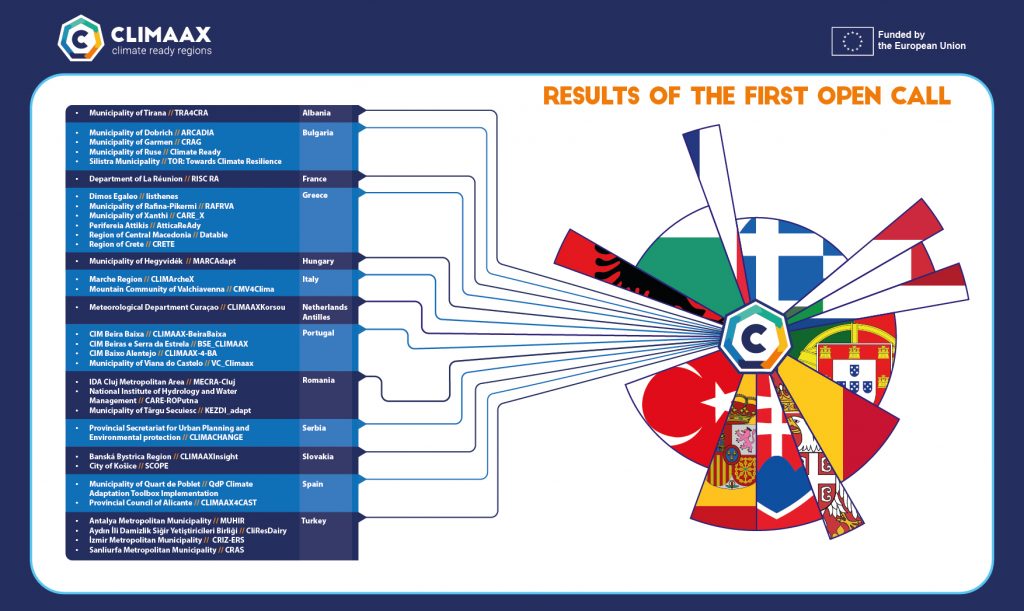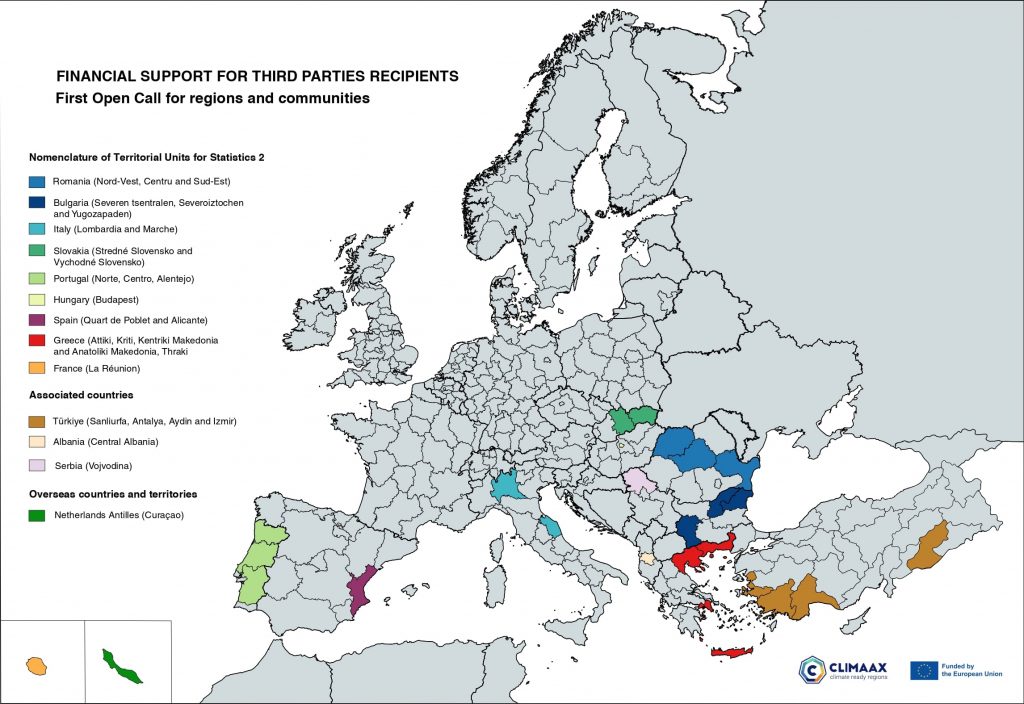Thirty-two European regions, coming from 13 countries, have been selected to receive, together, more than EUR 5,4 million to perform a regional Climate Risk Assessment. The selection committee has announced the results of the first open call of the CLIMAAX project which supplies up to EUR 300,000 lump sum funding per selected proposal.
Climate change is one of the most significant and urgent challenges facing the world today. The increasing frequency and intensity of extreme weather events, rising sea levels, and other climate-related hazards pose significant risks to economies, societies, and ecosystems across the globe. It is critical to understand these risks and develop effective strategies to manage and adapt to them.
Regional and local climate risk assessments are critical for collective decision-making on how to adapt to climate risks, prioritise goals and visions, and coordinate adaptation processes across various aspects of community living. The focus is on ensuring the prosperity and resilience of communities and the safety and integrity of the environment in which they reside.
The main objective of CLIMAAX is to support the implementation of the EU Adaptation Strategy and of the first objective of the Horizon Europe Mission Adaptation: preparing and planning for climate resilience. Through two open calls, the project aims to select at least 60 regions and/or communities that will implement the proposed methodological Framework and supporting Toolbox to conduct regional/local multi-risk Climate Risk Assessments.
The selected beneficiaries – primarily public regional and local institutions – must be established in any EU Member States and their Overseas Countries and Territories or Horizon Europe Associated Countries. The first open call ran from 8th of December 2023 to 22nd of March 2024. The selection committee included representatives of the consortium partners as well as delegates from the Directorate-General for European Civil Protection and Humanitarian Aid Operations, the Disaster Risk Management Knowledge Centre of the European Commission and its Joint Research Centre, and the Mission Secretariat/CINEA, as observers, who made the final selection from the 119 submitted proposals.
After an initial check, 16 submitted proposals were deemed non-eligible. After the 103 eligible applications were reviewed on the basis of an in/out scope screening, another 2 were deemed ineligible, 10 were out of scope and 91 were considered evaluable. The applications were evaluated according to the criteria of Relevance, Impact and Implementation – each criterion scores from 0 to 5 points. Unfortunately, 22 proposals did not meet the overall minimum threshold of 10 points (as the sum of the three criteria scores) or did not reach the minimum for each individual criterion (3 points).
The 69 applications that scored above the threshold received additional points to the overall score to prioritize regions or communities with high vulnerability and low adaptive capacity to climate change. This aspect was evaluated following the regional composed Vulnerability Index produced by the JRC Disaster Risk Management Knowledge Centre.
The final list of selected recipients consists of 32 applications; they will receive, together, EUR 5.438.891. The EU grant contribution that each applicant may receive is based on a lump sum scheme applying a Country Correction Coefficient (CCC) that considers the country in which the third party is located. The maximum amount of financial support ranges between EUR 115.227 and EUR 300.000.

Greece counts the largest number of selected proposals (6, maximum per each country), followed by Bulgaria, Portugal, and Turkey (4). Three selected proposals came from Romania, two from Italy, Slovakia and Spain, one from Albania, France, Hungary, Netherlands Antilles (Curaçao) and Serbia.
Given the nature of the works required for the implementation, the grant is foreseen to be executed with the assistance of external services by the public authorities/institutions. This shall require the preparation of dedicated public procurements following the national procedures to acquire complementary technical knowledge needed to implement the regional/local multi-risk Climate Risk Assessments (CRA) in most of the sub-projects.

“I am impressed by the number and diversity of applications we received. We are polishing the CLIMAAX Handbook to ensure a successful start of the selected Third Party projects after summer.”
Frederiek Sperna Weiland, project coordinator of CLIMAAX and senior advisor in climate change assessments related to floods, droughts and water availability at Deltares.“The 60 regional and local CLIMAAX implementation projects provide a hands-on learning opportunity to transform current climate risk assessment methodologies into operational tools to support the enhancement of risk management plans and the identification of adaptation strategies at the regional level. Moreover, these projects will foster a distributed regional knowledge ecosystem, bringing together a network of actors capable of supporting climate change adaptation across Europe.”
Daniel Sempere-Torres, project co-coordinator of CLIMAAX and director of the Center of Applied Research in Hydrometeorology of the Universitat Politècnica de Catalunya.
Applicants who were not selected in the first one are welcome to participate in the second Open Call, which was launched in the 1st week of July and will close on the 15th of October 2024.
STATUS UPDATE (5/8/24): During the further evaluation and formal document review in the sub-granting process, 2 of the pre-selected beneficiaries were removed from the list published on 15/7/24 and replaced by beneficiaries from the waiting list which were ranked highest after the already pre-selected beneficiaries. The selection committee provides the final list of selected beneficiaries.



